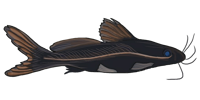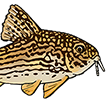L134 Not Eating?
- Shaun
- Posts: 229
- Joined: 07 Jul 2006, 02:45
- My cats species list: 12 (i:0, k:0)
- Location 2: Australia
- Interests: Catfish...
L134 Not Eating?
I'm having trouble getting some newly purchased L134 to eat.
180Ltr Tank, lots of water movement and aeration, temp 26c, ph neutral, soft water. Tankmates are a trio of Zamora Catfish and a few small Pencilfish. I know the Zamoras are probably not an ideal tankmate.
I've been trying them on sinking pellets and algae wafers and they don't seem to be eating.
Can anyone give me any pointers?
Thanks,
Shaun
180Ltr Tank, lots of water movement and aeration, temp 26c, ph neutral, soft water. Tankmates are a trio of Zamora Catfish and a few small Pencilfish. I know the Zamoras are probably not an ideal tankmate.
I've been trying them on sinking pellets and algae wafers and they don't seem to be eating.
Can anyone give me any pointers?
Thanks,
Shaun
- MatsP
- Posts: 21038
- Joined: 06 Oct 2004, 13:58
- My articles: 4
- My images: 28
- My cats species list: 117 (i:33, k:0)
- My aquaria list: 10 (i:8)
- My BLogs: 4 (i:0, p:97)
- Spotted: 187
- Location 1: North of Cambridge
- Location 2: England.
Re: L134 Not Eating?
Warm, clean, well oxygenated water.
--
Mats
--
Mats
-
soltarii007
- Posts: 43
- Joined: 03 Apr 2007, 02:31
- My cats species list: 57 (i:0, k:0)
- My aquaria list: 5 (i:0)
- My BLogs: 1 (i:0, p:24)
- Location 1: Singapore
- Location 2: Singapore
Re: L134 Not Eating?
Add some blackwater.
-
andywoolloo
- Posts: 2751
- Joined: 02 Dec 2007, 02:55
- I've donated: $100.00!
- My cats species list: 12 (i:0, k:0)
- My aquaria list: 1 (i:1)
- Location 2: Sanger, California
Re: L134 Not Eating?
did you contact who you got them from and ask what they were eating prior? is that possible?
did you try hikari sinking carnivore pellets or sinking shrimp or defrosted frozen bloodworms or shirmp?
did you try hikari sinking carnivore pellets or sinking shrimp or defrosted frozen bloodworms or shirmp?
-
Luka
- Posts: 10
- Joined: 06 Dec 2005, 13:58
- My cats species list: 7 (i:0, k:0)
- Location 1: Czech Republic
Re: L134 Not Eating?
Are you sure they are not eating? Maybe you just don`t see them. Do they have sunken bellies?
If you usually feed the fish during the day, try put some extra food after the light turns off. And personally, I would turn the heater
to 28 degrease.
For newly purchased fish is better to have smaller quarantine tank, not only to catch on possible disease, but as a place where the fish don`t have any competitors for food and you can easily control them.
If you usually feed the fish during the day, try put some extra food after the light turns off. And personally, I would turn the heater
to 28 degrease.
For newly purchased fish is better to have smaller quarantine tank, not only to catch on possible disease, but as a place where the fish don`t have any competitors for food and you can easily control them.
- racoll
- Posts: 5258
- Joined: 26 Jan 2004, 12:18
- My articles: 6
- My images: 182
- My catfish: 2
- My cats species list: 2 (i:2, k:0)
- My aquaria list: 1 (i:0)
- Spotted: 238
- Location 1: London
- Location 2: UK
Re: L134 Not Eating?
As Luka said, these fish thrive in very warm water. 26C is too cold, especially for new imports.
I would maintain them at 30C+ while they settle in. However you must ensure the water is fully oxygenated.
Frozen bloodworms and Hikari algae wafers are the most eagerly accepted food in my experience.

I would maintain them at 30C+ while they settle in. However you must ensure the water is fully oxygenated.
Frozen bloodworms and Hikari algae wafers are the most eagerly accepted food in my experience.
Good advice. I would do this also.did you contact who you got them from and ask what they were eating prior? is that possible?
- Shaun
- Posts: 229
- Joined: 07 Jul 2006, 02:45
- My cats species list: 12 (i:0, k:0)
- Location 2: Australia
- Interests: Catfish...
Re: L134 Not Eating?
Contacting the breeder or previous owner is impossible due to circumstances, I do know for sure that they've been knocked around a bit and probably haven't fed very well for at least a week before I got them. Aside from that they're very good quality fish. Bellies were a little sunken when I first brought them home.
The good news is: they have started eating with gusto! Munching on everything from sinking pellets to Zuchinni and squash, also some frozen brine and bloodworm.
I've increased the temperature to 27c, don't want to make the Zamora Catfish too uncomfortable. The L134's came at an awkward time tank-wise, sure everyone's experienced that before!
Shaun
The good news is: they have started eating with gusto! Munching on everything from sinking pellets to Zuchinni and squash, also some frozen brine and bloodworm.
I've increased the temperature to 27c, don't want to make the Zamora Catfish too uncomfortable. The L134's came at an awkward time tank-wise, sure everyone's experienced that before!
Shaun
-
andywoolloo
- Posts: 2751
- Joined: 02 Dec 2007, 02:55
- I've donated: $100.00!
- My cats species list: 12 (i:0, k:0)
- My aquaria list: 1 (i:1)
- Location 2: Sanger, California
Re: L134 Not Eating?
I am so glad they are eating! 




